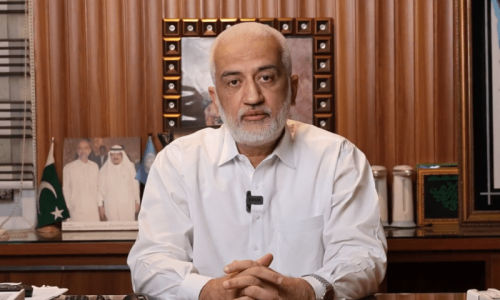KARACHI: Lyari instantly brings to mind the image of gangsters and criminals operating in congested lanes, apart from manning the 27 exit and entry points of the area. Ramzan Baloch, a government officer, activist, analyst and writer, while staying away from discussing gangsters and their ilk in his recently published memoir Lyari Ki Adhoori Kahani, instead reminisces about Lyari from the point of view of a resident.
His book is a collection of articles he wrote for the monthly magazine Sada-i-Lyari published by the Lyari Town administration, about events starting from the 1940s until 2014. The book itself is published by the Karachi Youth Initiative — a project funded by the USAID.
Over a span of 26 chapters, the book reveals the life of a Lyariite who saw it flourish with life and was witness to its unraveling due to the nexus of politics and crime. It chronicles the people he grew up with or met over the years, whether they were friends who dabbled in art and poetry, or others who were more into sports; and yet there were also those who chose writing.
The trajectory of Lyari is not difficult to share when one is a resident; Baloch makes sure to focus on simpler times and in a matter-of-fact way speaks of the bad times, too. There’s not a single chapter where he has openly pointed fingers but most of the criticism, if there is any, is subtle and marked with wit or sarcasm.
He also mentions this in the prologue of his book: “The incomplete and depressing elements of my life as well as that of Lyari are better to be felt than penned down. It is a memoir of the good times I spent as a kid which I still remember as if it happened yesterday.”
Born in Shah Baig Lane on Aug 4, 1944, Baloch writes about his humble life as the son of hardworking parents. From his life as a carefree six-year-old to witnessing the impact of the first martial law in Pakistan in 1958 as a 14-year-old, one chapter circles around his life and the events that took place at the same time.
The martial law brought with it a campaign to clean out the push carts, street vendors and unhygienic food items from hotels and streets alike. Teams of army soldiers patrolled various streets to check for push carts. The soldiers were also tasked to check hotels for standards of hygiene.
He writes about Abdul Haq, a hotel owner and a fan of classical music who was so engrossed in poetry and the arts that he named his hotel Aftab-i-Mauseeqi Hotel. Baloch writes that one day the usual team of army men patrolling the area went inside his hotel to check for cleanliness and found it to be so neat and tidy that they instantly gave the owner a certificate. Abdul Haq framed and hanged the certificate alongside paintings of different Mughal emperors. Shortly after his death, however, his children were unable to maintain the standard of the hotel and after two years the hotel was turned into a hairdresser’s shop with a tandoor beside it.
The nearest cinemas around Lyari, Kumar, Nigar, Roxy, Super and Noor Mehal were the usual outings for Baloch and his friends. He specifically mentions the screening of the movie, Aan starring Dilip Kumar, Nimmi, Nadra and Prem Nath, describing the long queues for tickets and not being able to buy the ticket even in black.
This reverie in the book is broken by the 1965 war and the sudden announcement from a siren on top of a dilapidated building on Art Chowk, also known as the Subaidaar Mohammad Ali building. The siren was otherwise used to wake the neighbourhood during the month of Ramazan. This bit, about the 1965 war, is only mentioned in passing and not dwelt upon any further.
The pictures accompanying the book show the streets of Lyari as vast and houses in an even order quite unlike the current housing disorder. Baloch also speaks about his stint in a theatre group run by a man named Aqeel who asked him to play the part of a simpleton. The play was eventually shelved, but Baloch writes: “Though I could not play the role on stage, I had no idea I’ll have to play this role in real life for a long time.”
Other chapters speak about the emergence of the National Awami Party and Pakistan Peoples Party, their conflict and collusion, and eventual coming to power of Zulfikar Ali Bhutto, and the people involved in the students unions of the 1960s under the leadership of Mairaj Mohammad Khan.
Published in Dawn, November 16th, 2015













































Dear visitor, the comments section is undergoing an overhaul and will return soon.